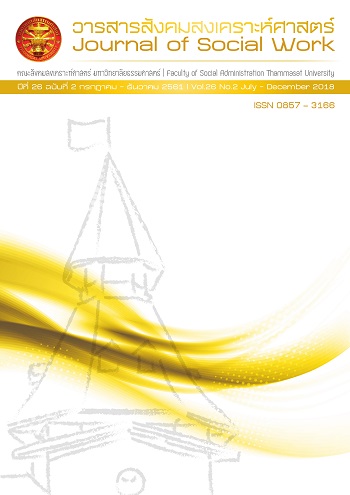Analysis of the Learning Process to Empower the Community in Preventing Human Trafficking
Keywords:
: Community Learning Process, Empowerment, Human Trafficking PreventionAbstract
The objective of this research is to analyses the learning process to empower the community in preventing trafficking and to propose a learning process to do so. This research employs both qualitative and case study research. Both communities of origin and destination of victims are studied in terms of forced labour as well as sex worker. Empirical information are collected by Rapid Rural Appraisal, Participatory observation, In-depth interview and Focus group discussion. Finding from this field study is then proposed as a way to create a learning process to empower communities in preventing human trafficking.
Research result shows that there are four characteristics of learning process to empower a community to prevent human trafficking namely 1) group process 2) Active Learning 3) Problem Oriented and 4) Vertical Learning. They are condition by 1) Members of the group, as victims of human trafficking, want to join in combatting the problem through their own experinces;2) at the urging of external organization working in partnership; 3) state network and local organization join in by mainly employing the group lessons and methods. Guild lines for community learning process following four steps: 1) strengthening perception and awareness; 2) promoting questions from shared problems; 3) promoting joint operations and 4) promotion communities in critiquing outcomes together.
References
จิตติ มงคลชัยอรัญญา และคณะ. (2550). การศึกษาบทบาทของชุมชนที่พึงประสงค์ในการป้องกันและเฝ้าระวังปัญหาการค้ามนุษย์โดยเฉพาะกรณีการค้าหญิงและเด็ก. กรุงเทพฯ: สำนักงานกิจการสตรีและสถาบันครอบครัว กระทรวงการพัฒนาสังคมและความมั่นคงของมนุษย์.
ชาย โพธิสิตา. (2549). ศาสตร์และศิลป์แห่งการวิจัยเชิงคุณภาพ. พิมพ์ครั้งที่ 2. กรุงเทพฯ: อัมรินทร์ พริ้นติ้งแอนด์พับลิชชิ่ง.
นิศา ชูโต. (2540). การวิจัยเชิงคุณภาพ. กรุงเทพมหานคร : พี. เอ็น. การพิมพ์.
ปาริชาติ วลัยเสถียรและคณะ.(2540).รายงานวิจัยกระบวนการเรียนรู้และการจัดการความรู้ของชุมชน. กรุงเทพมหานคร: สำนักงานกองทุนสนับสนุนการวิจัย (สกว.).
แฟร์ เปาโล. (2517). การศึกษาสำหรับผู้กดขี่. แปลและเรียบเรียงโดย ช เขียวพุ่มพวง. กรุงเทพมหานคร: สหพันธ์นักศึกษาเสรีแห่งประเทศไทยจัดพิมพ์.
แฟร์ เปาโล. (2522). การเคลื่อนไหวทางวัฒนธรรมเพื่อเสรีภาพ. แปลและเรียบเรียงโดย มนตรี กรรพุมมาลย์. กรุงเทพมหานคร:เจริญวิทย์การพิมพ์.
มูลนิธิผู้หญิง. (2543). การค้าหญิง: จากแนวคิดเรื่องสิทธิมนุษยชนสู่การนำไปปฏิบัติ. กรุงเทพมหานคร: สำนักพิมพ์มูลนิธิผู้หญิง.
สำนักงานปลัดกระทรวงการพัฒนาสังคมและความมั่นคงของมนุษย์. (2553). นโยบาย ยุทธศาสตร์ และมาตรการในการป้องกันและปราบปรามการค้ามนุษย์ พ.ศ.2554-2559. กรุงเทพฯ: บริษัท อีเล็ฟแว่นคัลเลอร์ส จำกัด.
ศิริพร สะโครบาแนค.(2548). การค้ามนุษย์ แนวคิด กลไก และประเด็นท้าทาย. กรุงเทพมหานคร: อมรินทร์พริ้นติ้งแอนด์พับลิซชิ่ง.
ศูนย์ปฏิบัติการป้องกันและปราบปรามการค้ามนุษย์แห่งชาติ, กระทรวงการพัฒนาสังคมและความมั่นคงของมนุษย์. นโยบาย ยุทธศาสตร์ และมาตรการในการป้องกันและปราบปรามการค้ามนุษย์ (พ.ศ.2554 – 2559). กรุงเทพฯ: กระทรวงการพัฒนาสังคมและความมั่นคงของมนุษย์.
องค์กรสากลต่อต้านความเป็นทาส. (2546). การค้ามนุษย์ สิทธิมนุษยชนกับนิยามใหม่ของการคุ้มครองผู้ตกเป็นเหยื่อ. ลอนดอน สหราชอาณาจักร: องค์การสากลต่อต้านความเป็นทางและมูลนิธิผู้หญิง.
Ahari,S.S. et al.,Community based needs assessment in an urban area; A participatory action Research project. BMCPlulic Health.12:161-169. 2012.
Creswell, J.W.Education Research: Planning Conduction and Evaluating Quantitative and Freire, Paulo. (1970). Pedagogy of the Oppressed. New York: The Continuum Publishing. Qualitative Research.Upper Saddle River, NewJerey: Merrill Prentice Hall. 2002.
Freire,Paulo.Pedagogy of the Oppressed. New York: The Continuum Publishing, 1970.
Freire,Paulo.Pedagogy of hope.New York:The continuum Plublishing,1992.
Freire,Paulo.Teacher as culture workers: Letters to those who dare teach. New York: The Continuum Publishing, 1993.
Gibson,C.H. A Concept analysis of empowerment.Journal of Advanced Nursing.16.1991.
Yin, Robert K. (2003). Case study research: design and methods.Thousand Oaks, CA: SAGE Plublications Inc.
Zimmerman.M.andRappaport,J. Citizen participation ,perspective control and psychological Empowerment .American Journal of Community Psychology.1998.
Downloads
Published
How to Cite
Issue
Section
License
The manuscripts published in the Social Work Journal is the copyright of the Social Work Journal, Thammasat University
Any article or opinion appeared in the Social Work Journal will solely be under the responsibility of the author The Faculty of Social Administration, Thammasat University and the editors do not need to reach in agreement or hold any responsibility.



